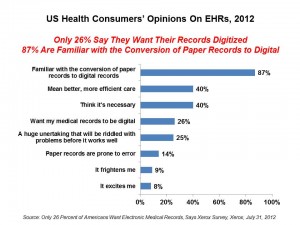
While 87% of U.S. adults are familiar with health providers converting paper medical records into digital records, only 26% — 1 in 4 — say they want their own medical records to go digital.
This sobering statistic comes as hundreds of thousands of doctors and hospitals are migrating to electronic health records (EHRs), motivated by the U.S. government’s HITECH act which provides incentives for the adoption and so-called meaningful use of EHRs.
To gauge U.S. consumers’ views on digital medical records, Xerox polled 2,147 U.S. adults ages 18 and via an online survey in May 2012.
The chart illustrates several key consumer perceptions among all patients
- 40% of people believe that digital records mean better, more efficient care
- 40% believe the move to digital records is necessary
- 25% see adoption of EHRs as a huge undertaken that will be “riddled” with problems before they work well
- 8% are each excited or frightened by the prospect of EHRs in their future.
Of those health consumers who have seen a health care provider, 26% say their providers have involved them in some way in the conversion from paper to digital records. These interactions could have involved signing consent forms for the conversion of the records, educating patients about access to their electronic records, and other encounters.
Health Populi’s Hot Points:
These findings from Xerox contrast with the survey from the CDC published earlier this month about physicians’ adoption of and early experience with EHRs, covered here in Health Populi. The topline of this physician survey is that most doctors are generally satisfied with their first wave of EHR adoption.Patients — health citizens, all — need to learn more about EHRs and why they underpin a modernized U.S. health system. In the coming months, several campaigns will be promoting the use of EHRs by providers and patients. One will be a broadcast and video campaign from the Office of the National Coordinator of Health IT promoting the concept of EHRs, their benefits and rationale, and consumers’ opportunities for engaging with them. Stay tuned for a clever animated segment to be launched at HealthIT.gov on August 7, 2012.




 Interviewed live on BNN Bloomberg (Canada) on the market for GLP-1 drugs for weight loss and their impact on both the health care system and consumer goods and services -- notably, food, nutrition, retail health, gyms, and other sectors.
Interviewed live on BNN Bloomberg (Canada) on the market for GLP-1 drugs for weight loss and their impact on both the health care system and consumer goods and services -- notably, food, nutrition, retail health, gyms, and other sectors. Thank you, Feedspot, for
Thank you, Feedspot, for  As you may know, I have been splitting work- and living-time between the U.S. and the E.U., most recently living in and working from Brussels. In the month of September 2024, I'll be splitting time between London and other parts of the U.K., and Italy where I'll be working with clients on consumer health, self-care and home care focused on food-as-medicine, digital health, business and scenario planning for the future...
As you may know, I have been splitting work- and living-time between the U.S. and the E.U., most recently living in and working from Brussels. In the month of September 2024, I'll be splitting time between London and other parts of the U.K., and Italy where I'll be working with clients on consumer health, self-care and home care focused on food-as-medicine, digital health, business and scenario planning for the future...